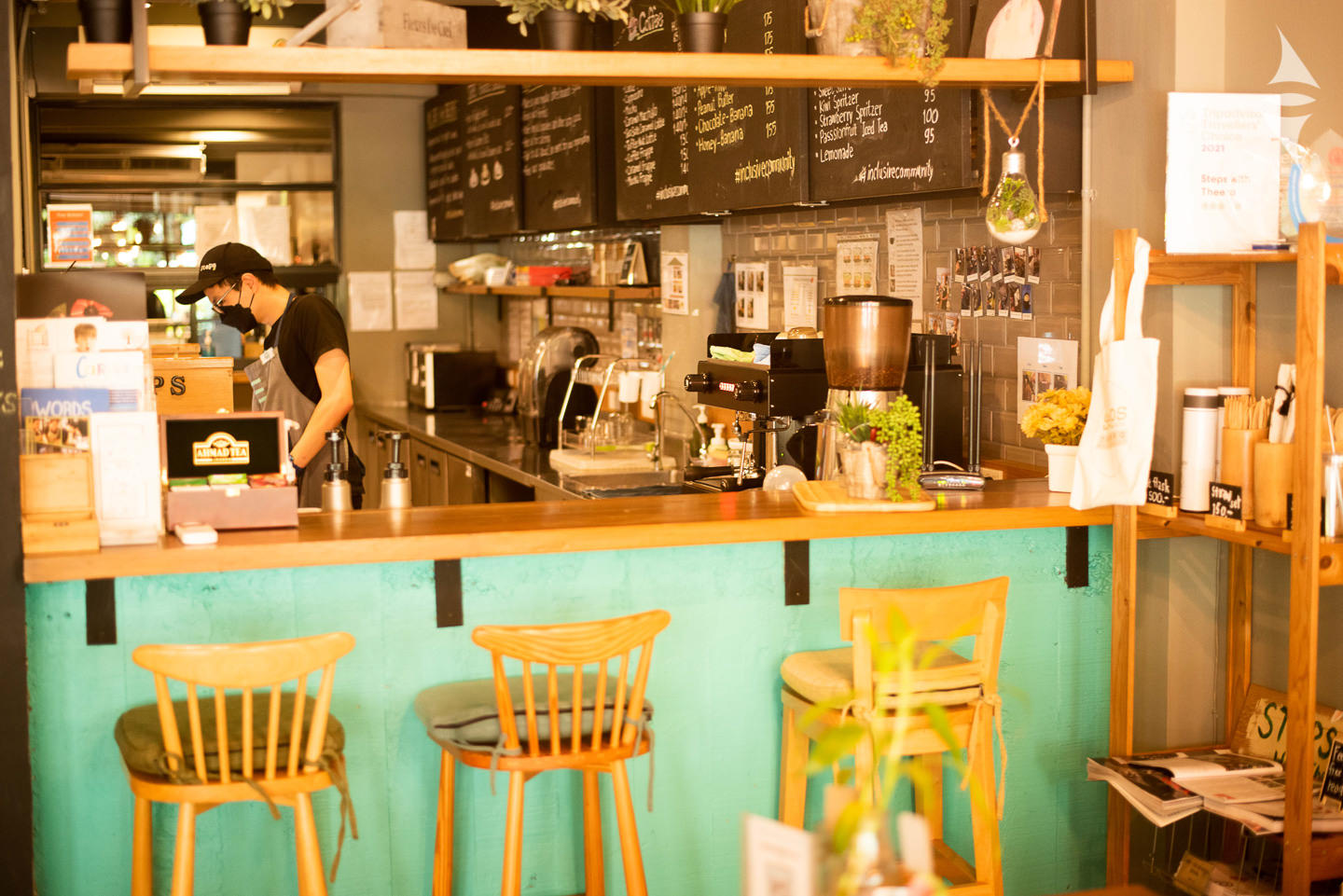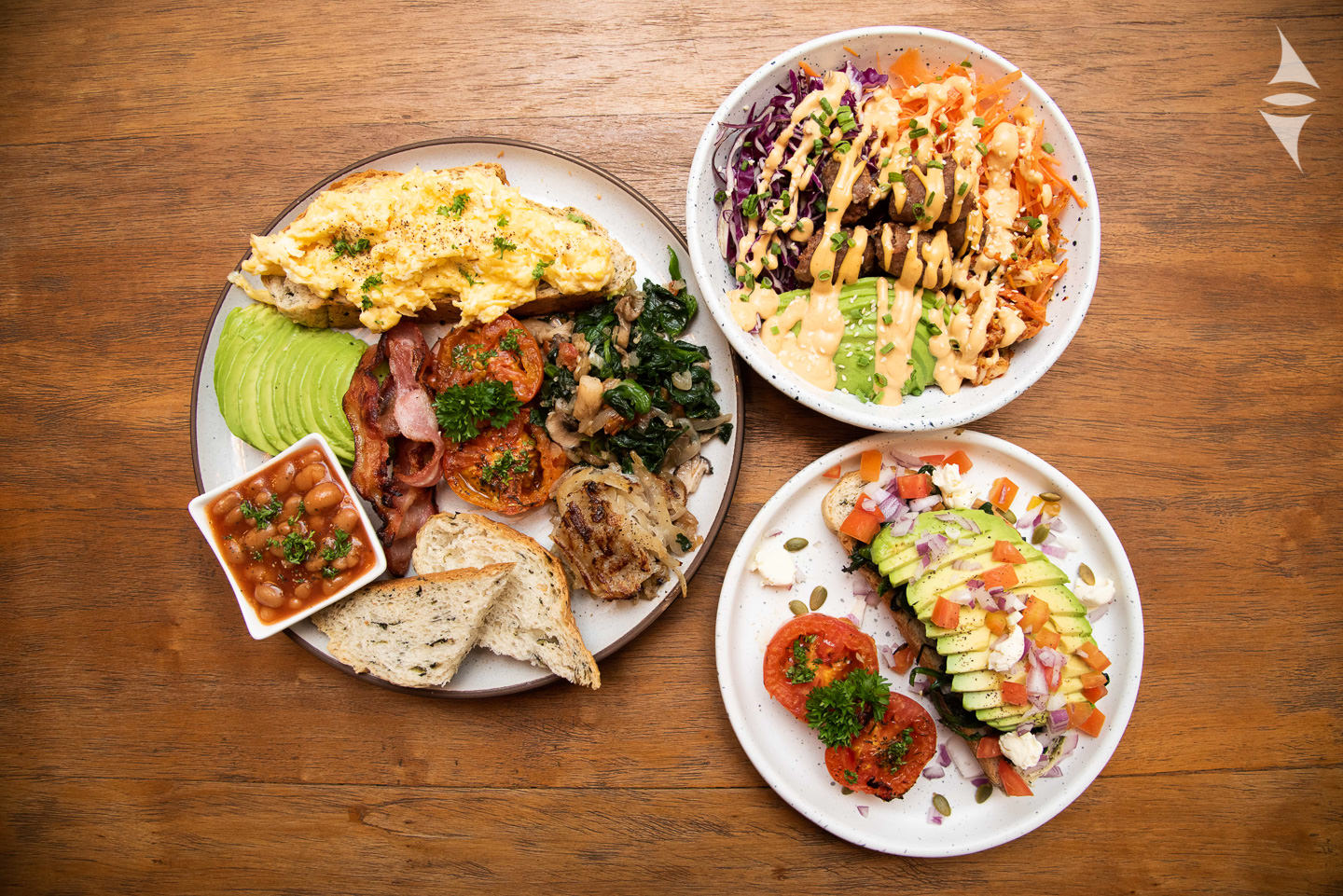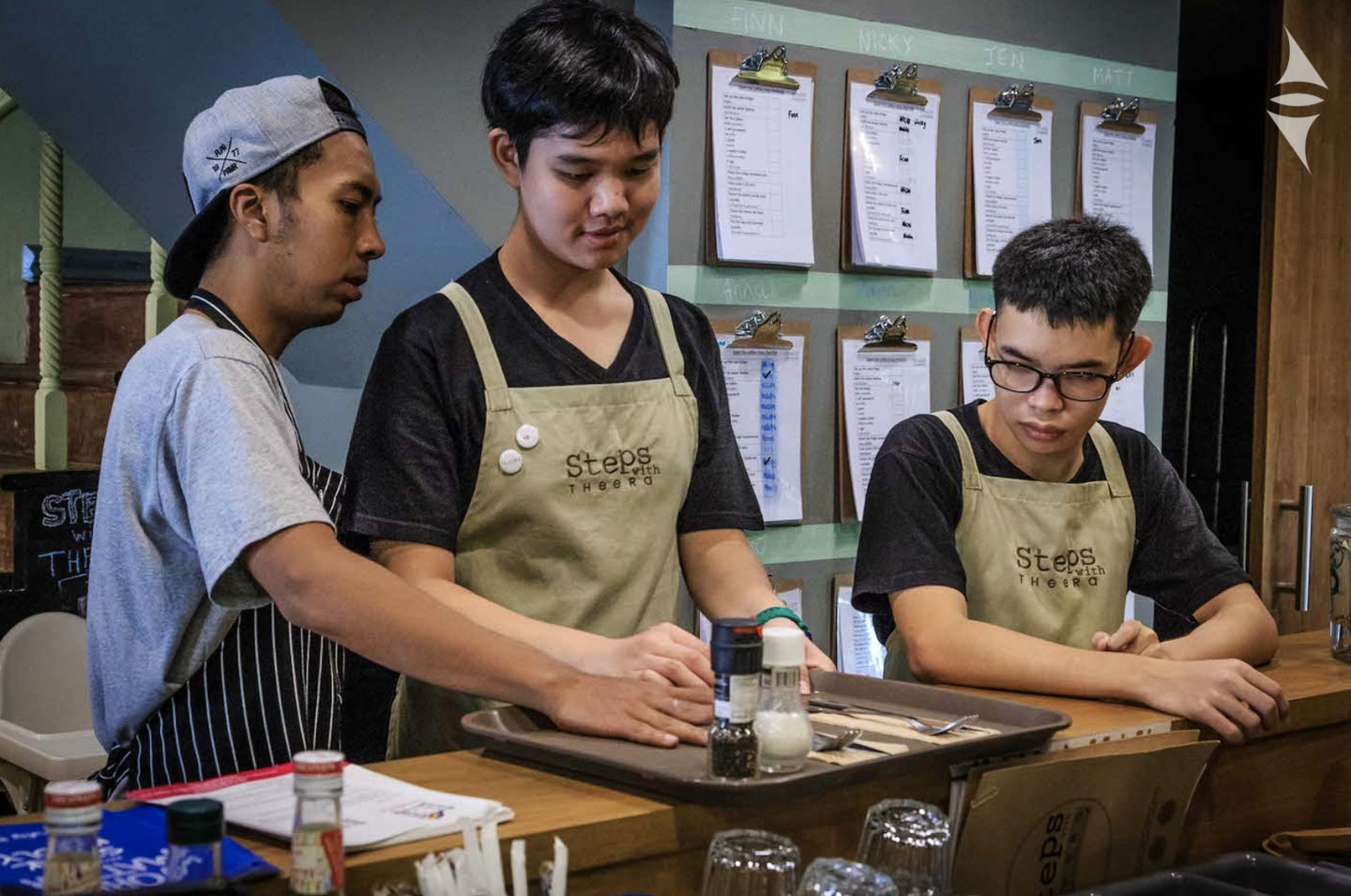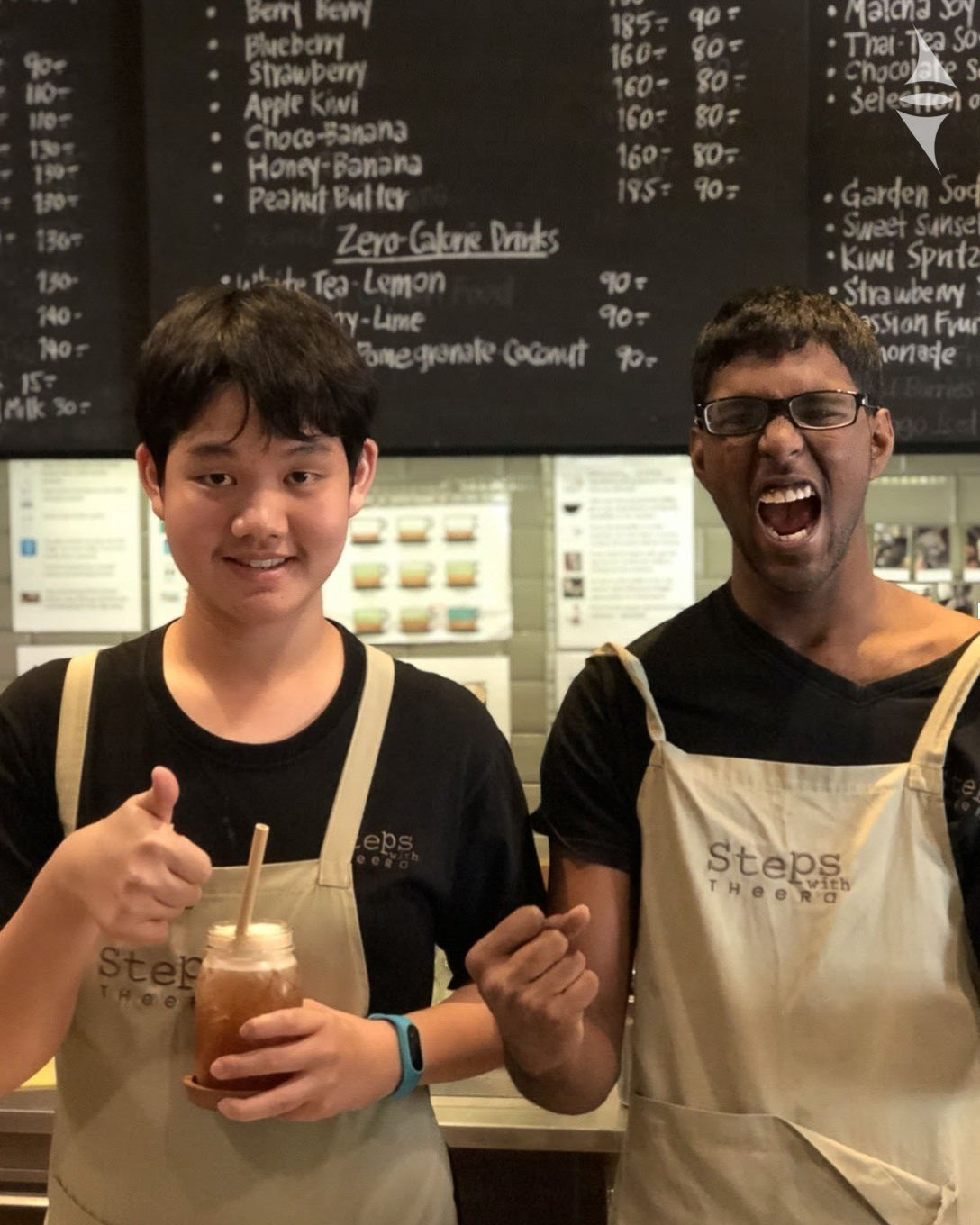
เอกมัย ย่านแห่งคอนโดและรถติดในช่วงกลางวันที่จะมีชีวิตชีวาขึ้นมาในยามค่ำคืน มีร้านอาหารเก่าแก่มากมายที่ผู้คนเดินทางมาเสาะหารับประทาน ก่อนถึงสี่แยกแห่งตำนานกลางซอย เลี้ยวเข้าไปในซอยเอกมัย 12 ที่เป็นย่านพักอาศัย เราจะได้พบกับร้านเล็กๆ ตรงกลางซอยที่ดูจากภายนอกดูเหมือนที่พักอาศัยธรรมดา แต่เมื่อได้เข้าไปในร้านจะเห็นการตกแต่งร้านสไตล์คาเฟ่ที่เป็นกันเองอย่างร้าน “Steps” อีกหนึ่งร้านธรรมดาที่ไม่ธรรมดา แต่เป็นร้านที่เป็นศูนย์ฝึกอบรมทักษะอาชีพให้กับผู้ที่มีความแตกต่างด้านการเรียนรู้ (Neurodivergent Community) และเมื่อน้องๆ ได้ผ่านการฝึกอบรมแล้วก็จะได้มีโอกาสใช้ทักษะจริงในการฝึกงานให้กับร้านอาหารของ Steps อีกด้วย วันนี้เราได้มาคุยกับคุณเอื้อง - ธีตา โหตระกิตย์ อดีตนักการทูตที่ผันตัวมาเป็นเชฟถึงความเป็นมาของร้านที่ดูเหมือนธรรมดาแต่ไม่ธรรมดาที่พยายามจะสร้างความเปลี่ยนแปลงทางสังคมจากก้าวเล็กๆ ไปสู่ก้าวที่มีความสำคัญให้กับน้องๆ กลุ่มนี้

ความเป็นมาของร้านและจุดเริ่มต้นที่ให้น้องๆ มาฝึกงานที่ร้านอาหาร
Steps เริ่มต้นมาจากคุณ Max Simpson ผู้เชี่ยวชาญด้านการศึกษาพิเศษและ inclusion และตัวเอื้องเองที่ได้ร่วมมือกันสร้างสเตปส์ขึ้นมาเพราะมองเห็นว่ากลุ่ม Neurodivergent Community หรือผู้ที่มีความแตกต่างด้านการเรียนรู้ (เช่นผู้ที่มีภาวะออทิสซึม ดาวน์ซินโดรม) มีศักยภาพเช่นเดียวกับคนอื่นๆ ทั่วไป เพียงแต่มักจะประสบอุปสรรคในการเข้าถึงโอกาสด้านการเรียนรู้และการฝึกทักษะที่เหมาะสมกับรูปแบบการเรียนรู้ของพวกเขา ทางเรามีศูนย์ฝึกอบรมทักษะอาชีพและทักษะการดำรงชีวิต มีทีม job coach ที่มีความเชี่ยวชาญด้านการฝึกสอนทักษะอาชีพ และทีมผู้เชี่ยวชาญในสายอาชีพ เช่น บาริสต้า เชฟ ผู้จัดการร้านอาหาร ที่จะฝึกสอนทักษะด้านอาชีพด้าน hospitality ในร้านคอฟฟี่ชอปของเรา การเรียนการสอนของเราเน้นการลงมือทำ การที่ผู้ฝึกได้ทดลองลงมือทำเองจะช่วยพัฒนาความสามารถในหลายๆ ด้าน ทั้งความมั่นใจ การสื่อสาร และทำงานร่วมกับผู้อื่น สร้างความภาคภูมิใจในตนเองได้เป็นอย่างดี โดยจุดมุ่งหมายของเรา คือการสร้างโอกาสในการทำงานที่เท่าเทียม ที่จะช่วยให้ทุกคนสามารถมีชีวิตที่มีเป้าหมาย มีงานที่ยั่งยืน และมีความภาคภูมิใจในตนเองได้







ทำไมถึงที่จะทำร้านอาหารไปด้วย
จุดมุ่งหมายของการทำร้านคอฟฟี่ชอปมี 2 ส่วนหลักๆ ส่วนแรกคือการเป็นสถานที่ในการฝึกทักษะในการทำงานให้กับผู้ฝึก (trainee) ของเรา ซึ่งพวกเขาจะได้รับทั้งทักษะทางสายอาชีพ hospitality เช่น การทำเครื่องดื่ม ทำขนมเบเกอรี่ ทำอาหาร customer service และ transferable skills เช่น ความสามารถในการสื่อสาร การแก้ไขปัญหาเฉพาะหน้า การทำงานเป็นทีม ซึ่งเป็นทักษะที่พวกเขาจะสามารถนำไปใช้ได้ไม่ว่าจะไปทำงานในสายอาชีพไหนก็ตาม หน้าที่อีกส่วนหนึ่งของคอฟฟี่ชอปคือการเป็น awareness raising platform ที่จะเปิดโอกาสให้ลูกค้าจากภายนอกที่เข้ามาใช้บริการ ได้มีปฏิสัมพันธ์กับผู้ฝึกกลุ่ม neurodivergent community นี้ ได้เห็นว่าพวกเขาสามารถทำงานได้เหมือนคนอื่นๆ ซึ่งจะนำไปสู่การเปลี่ยนทัศนคติเชิงลบในสังคมทั่วไปว่าคนกลุ่มนี้ไม่มีศักยภาพ กลายเป็นการมองว่าคนกลุ่มนี้มีความสามารถ สามารทำงานและสร้างประโยชน์ให้กับสังคมได้เช่นเดียวกับคนอื่นๆ ทั่วไป





Concept ร้านอาหาร
Concept ของร้านเราจะเป็นพื้นที่ที่เปิดกว้าง สบายๆ เหมาะสำหรับพบปะเพื่อนหรือพาครอบครัวมาทานอาหาร แนวอาหารของเราจะเป็นอาหารและขนมเบเกอรี่เพื่อสุขภาพ มีตั้งแต่แบบปกติ, Gluten-free, Dairy-free, Vegetarian และ Vegan เป็นอาหารที่ทานได้กันทั้งครอบครัวและสุขภาพดี
ทางผู้ฝึกก็จะมีหมุนเวียนกันมาฝึกงานที่ร้านเพื่อได้รับทักษะจากการลงมือปฏิบัติจริง จะมี Job Coach ที่จะคอยช่วย Support และให้คำปรึกษา สำหรับลูกค้า เราจะมีบอร์ดที่เชิญชวนลูกค้าเขียนรีวิวประสบการณ์ที่ได้จากการมาทานอาหารที่ร้าน


ที่มาของชื่อร้าน
Steps มาจาก steps to employment, steps to independence
น้องๆ ที่มาฝึกงานที่ร้านมีขั้นตอนการรับมาฝึกงานอย่างไรและจะได้อะไรกลับไป
หลักสูตรของสเตปส์จะปรับมาจากหลักสูตรของ ASDAN จากประเทศอังกฤษที่เน้นเรื่องการสอนทักษะอาชีพและการดูแลตนเองจากการลงมือปฏิบัติ โปรแกรมที่เรามีจะเริ่มต้นตั้งแต่ โปรแกรม First Steps ซึ่งเป็นโปรแกรมที่เตรียมความพร้อมเรื่องทักษะชีวิตด้านต่างๆ ในการทำงานและใช้ชีวิต โปรแกรม Next Steps จะเป็นการโปรแกรมที่เริ่มเข้าสู่การทดลองลงมือจริง มีหน้าที่ในร้านคอฟฟี่ชอปหรือ Business Service Center และมีการเตรียมพร้อมด้าน transferable skill ที่สำคัญอีกด้วย และสุดท้าย โปรแกรม Future Steps ที่จะมีการเรียนที่เน้นในด้านการเข้าสู่โลกทำงานจริง เช่น การเขียน CV เพื่อเข้าทำงาน
สเตปส์เป็นพื้นที่เปิดกว้างในการเรียนรู้ ผู้ฝึกจะได้รับการดูแลจากผู้เชี่ยวชาญ ได้เรียนรู้อย่างอิสระและลงมือทำ ได้รับความมั่นใจและรู้สึกภาคภูมิใจในตัวเอง

สิ่งที่ต้องทำความเข้าใจในการทำงานร่วมกับคนกลุ่มนี้
สิ่งที่ต้องทำความเข้าใจกับการทำงานร่วมกับ Neurodivergent Community น่าจะเป็นเรื่องการสื่อสาร บางครั้งจะต้องใช้เวลาและทำความเข้าใจ การสื่อสารที่สั้นและกระชับ บางครั้งอาจใช้ภาพเป็นตัวช่วย จะช่วยให้ผู้ฝึกสื่อสารได้ง่ายขึ้น แต่โดยรวมแล้วศักยภาพของคนกลุ่มนี้นั้นไม่ได้แตกต่างไปจากคนทั่วไปเลย พวกเขาสามารถที่จะทำงานได้อย่างมีระเบียบ มีประสิทธิภาพ และเอาใจใส่ในรายละเอียดได้เป็นอย่างดี

มองภาพรวมการทำงานของคน Neurodivergent เอาไว้ยังไงบ้าง และการนำคนเหล่านี้เข้าสู่สังคม
ทางเรามองว่าในประเทศไทยมีกลุ่ม Neurodivergent อยู่จำนวนนึงเลย สถิติสำหรับคนกลุ่มนี้ในบ้านเรายังไม่ชัดเจนนัก แต่จากสถิติของหน่วยงาน CDC ของสหรัฐอเมริกา จะมีคนที่อยู่ในกลุ่ม neurodivergent 1 คนต่อประชากรทุกๆ 44 คน ซึ่งถือว่าเป็นตัวเลขที่ค่อนข้างสูง ดังนั้น การสร้างศักยภาพในการทำงานให้คนกลุ่มนี้เป็นสิ่งสำคัญสำหรับจำนวนแรงงานในการพัฒนาเศรษฐกิจของประเทศ หน้าที่ของเรานอกเหนือจากการช่วยเตรียมทักษะและความพร้อมให้กับคนกลุ่มนี้แล้ว เราต้องการทำหน้าที่เป็นองค์กรตัวอย่างที่จะทำให้บริษัทอื่นๆ ทั่วไปในสังคมเห็นว่าการจ้างงานคนกลุ่มนี้นั้นสามารถทำได้ และบริษัทยังคงสามารถดำเนินการได้อย่างมีประสิทธิภาพ สร้างผลกำไร สร้างวัฒนธรรมองค์กรที่มีคุณค่าที่จะช่วยให้พนักงานมีความภูมิใจในองค์กรของตนเอง การสร้าง inclusion ในสังคม ไม่ใช่เรื่องที่องค์กรใดองค์กรหนึ่งจะสามารถทำได้ด้วยตัวคนเดียว แต่เป็นเรื่องที่ทุกๆ องค์กร ทุกๆ ส่วนในสังคมจะต้องช่วยทำไปพร้อมๆ กัน
ทุกวันนี้ทางสเตปส์มี employment partner ที่ทำงานร่วมกับเราในการให้ internship จ้างงาน และสร้างงานให้กับผู้ฝึกและผู้ที่จบหลักสูตรการฝึกทักษะจากเราไปอย่างบริษัท Shopee, RMA, BCCT สำหรับงานเอกสารต่างๆ หรือ El Mercado โรงแรม Hyatt และ theCOMMONS ที่มีการจ้างงานผู้ฝึกจากสเตปส์



มีเรื่องประทับใจในการทำงานจากการเปิดฝึกงานบ้างไหม
น่าจะเป็นการที่เราเห็นผู้ฝึกได้รับการพัฒนาและมีความมั่นใจในตัวเอง เห็นเค้ามีความสุขจากการที่ได้เป็นตัวของตัวเองในพื้นที่ที่พวกเค้ารู้สึกว่าปลอดภัยและสามารถเป็นตัวของตัวเองได้โดยไม่ถูกตัดสินจากภายนอก สิ่งหนึ่งที่เรามักจะพบบ่อยๆ ตอนผู้ฝึกเริ่มเข้ามาคือเรื่องการขาด motivation ในการทำงาน เพราะหลายคนมักจะได้รับประสบการณ์เชิงลบในโรงเรียนที่พวเขาเคยอยู่หรือจากครอบครัว ไม่ได้รับการสนับสนุนหรือรูปแบบการสอนที่เหมาะสมต่อการเรียนรู้ของพวกเขา ทำให้ขาดความมั่นใจในตนเอง คิดว่าตัวเองทำไม่ได้ และไม่มีแรงจูงใจที่จะทำอะไรใหม่ๆ ซึ่งเราแก้ปัญหาโดยใช้ peer mentorship การที่พวกเขาเห็นเพื่อนประสบความสำเร็จ มีงานทำ เป็นแรงหลักดันให้ผู้ฝึกคนอื่นๆ เห็นและอยากทำได้เช่นเดียวกัน


ผลกระทบโควิดและต้องปรับตัวอย่างไร
เรามีการปรับตัวกับสถานการณ์โควิดที่ผ่านมาด้วยการสร้างบริการใหม่ที่เรียกว่า Business Service Centres ที่รับทำงานด้านเอกสารจากบริษัท การคัดแยกเอกสาร แสกน หรือเปลี่ยนเอกสารให้เป็นไฟล์ดิจิทัล โดยผู้ฝึกของเราจะได้ทดลองทำสิ่งที่ถนัดหรือสลับหน้าที่บ้าง เรามองว่าเป็นสิ่งที่ผู้ฝึกได้เพิ่มทักษะด้านงานเอกสารและเพิ่มทักษะสายอาชีพใหม่สู่งานออฟฟิศหรืองานแอดมินมากขึ้น
สำหรับในส่วนของคอฟฟี่ชอป เราพัฒนาการให้บริการในรูปแบบออนไลน์ผ่านเว็บไซต์ของเราเองคือ https://www.theerahealthybakeroom.com จริงๆ เรามีเว็บไซต์ในการจำหน่ายสินค้าเบเกอรี่ของเราอยู่แล้วก่อนช่วงโควิด แต่โควิดเป็นโอกาสที่ทำให้เราหันมาให้ความสำคัญกับมันมากขึ้น ทำการพัฒนาให้ลูกค้าสามารถใช้บริการออนไลน์ได้ง่ายขึ้น ทุกวันนี้ รายได้จากการจำหน่ายสินค้าเบเกอรี่ผ่านช่องทางออนไลน์ของเราเองสูงขึ้นมากและแทบจะเป็นหนึ่งในรายได้หลักของส่วนคอฟฟี่ชอปเลย
อนาคตของร้านน่าจะไปทิศทางไหน
เราหวังว่าอนาคตเราพัฒนาไปมากขึ้นในด้านการ Collaborate กับบริษัทที่ใส่ใจเรื่อง Inclusion และ Sustainability เพราะสองสิ่งนี้เป็นสิ่งที่มาคู่กัน เราหวังว่าจะมีการเรียนรู้หรือความเข้าใจกับกลุ่ม Neurodivergent มากขึ้นในสังคมไทย และมีพื้นที่เปิดกว้างที่จะรับเข้าทำงาน เพื่อให้พวกเขามีกำลังใจที่เป็นส่วนหนึ่งของสังคม มีกำลังใจการดำเนินชีวิตที่มีความหมายและภาคภูมิใจในตนเอง


อะไรที่อยากจะเห็นรัฐบาลผลักดันในเรื่องนโยบายของ Neurodivergent Community
เราอยากให้มีการผลักดันมากกว่านี้ในมาตรา 33 ของ พรบ. ส่งเสริมและพัฒนาคุณภาพชีวิตคนพิการ 2550 ในการจ้างงานผู้พิการหรือกลุ่มคนที่มีความแตกต่างด้านการเรียนรู้มากขึ้น ตามมาตรา 33 บริษัทที่มีพนักงานมากกว่า 100 คนจะต้องจ้างงานผู้พิการด้วยอัตราส่วนผู้พิการ 1 คนต่อพนักงานทั่วไป 100 คน จากภาพรวมที่เห็นหลายบริษัทอาจจะเลือกที่จะจ่ายเงินเข้ากองทุนสนับสนุนผู้พิการตามมาตรา 34 เพื่อทดแทนการจ้างงาน เราอยากให้รัฐบาลพิจารณาให้การสนับสนุนบริษัทที่เลือกที่จะดำเนินการตามมาตรา 33 มากขึ้นเพิ่มเติมจากผลประโยชน์ทางด้านภาษี เช่น การให้งบประมาณในการสนับสนุนการปรับสภาพแวดล้อมในการทำงานให้เอื้อต่อการรับผู้พิการเข้าทำงาน หรือการให้การสนับสนุนด้านเงินเดือน ซึ่งจะทำให้บริษัทต่างๆ อยากจะจ้างงานผู้พิการเหล่านี้ในองค์กรของตนเองมากขึ้นแทนการจ่ายเงินเข้ากองทุน ซึ่งจะเป็นการสร้าง inclusion ให้เกิดขึ้นอย่างแท้จริง


เมนูที่ต้องลองของร้าน
Korean Rice Bowl with plant based sausage (Vegan)
ตัวนี้เป็น Homemade plant-based sausage ที่ทำมาจาก plant-based meat ผสมกับตัวเห็ดทำให้เนื้อสัมผัสและรสชาติเหมือนไส้กรอกปกติ เสริฟคู่กับ korean sauce ที่เป็นทั้ง korean red sauce และ korean mayo ทำให้มีรสชาต









































